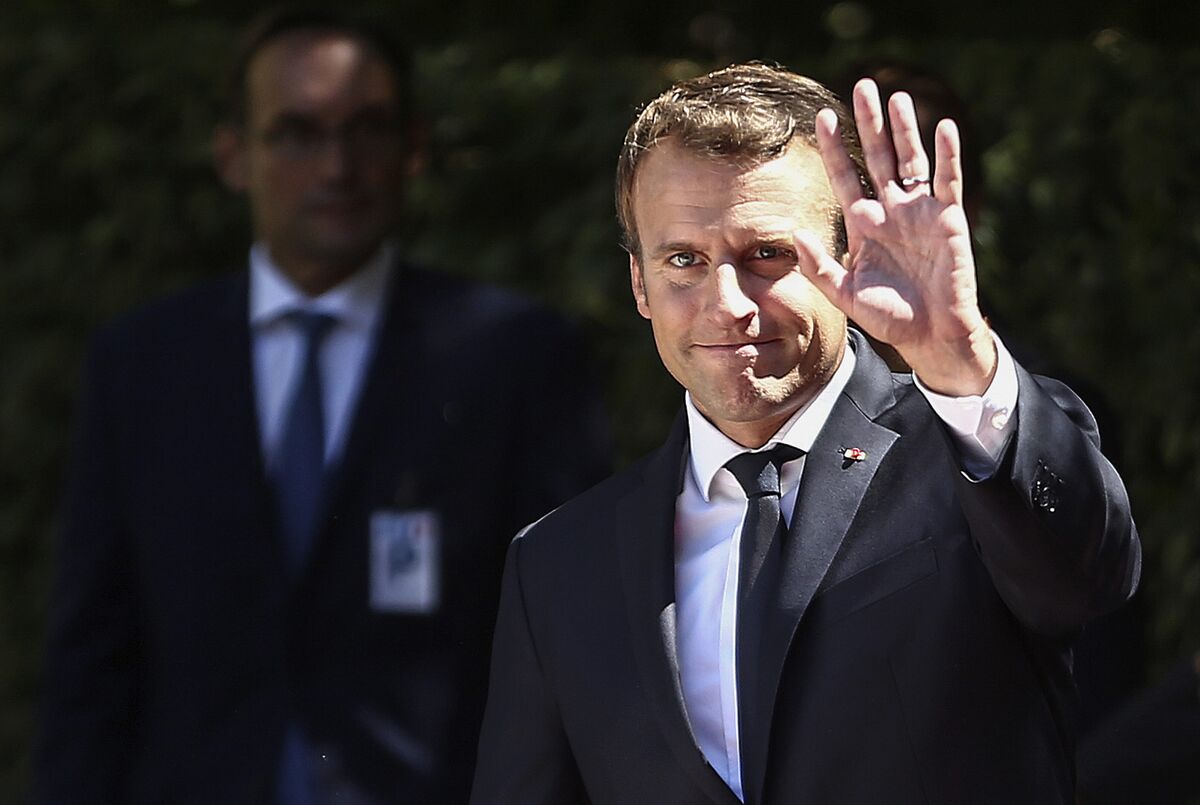
President Emmanuel Macron’s effort to scrap France’s wealth tax is overshadowing other government policies as opponents portray him as an “anti-Robin Hood” who is taking from the poor to give to the rich.
With his first budget now being scrutinized by lawmakers, Macron and his ministers are in the uncomfortable position of defending a cut in the tax on personal assets over 1.5 million) while also having cut housing subsidies for the poor. Bruno Le Maire said Wednesday that the top 1,000 payers of the wealth tax -- known as the ISF -- will collectively benefit to the tune of 400 million euros under the new budget. That amount is equivalent to savings from lower housing benefits, the opposition says.
“There is a widening public debate about Macron being the president of the rich,” Adrien Quatennens, the 27-year-old lawmaker of the left-leaning France Unbowed, said on France 5 television on the first day of the budget debate. “We believe it’s not just that; we think he’s the anti-Robin Hood, who is transferring wealth from the poor to the rich.”
The problem for Macron is that the charge is sapping his political capital at a time when his government is gearing up for its second-major economic reform -- this time an overhaul of the nation’s system of unemployment benefits. Despite ministers’attempts to explainthe government’s reasons for the wealth tax cut, Macron’s popularity is suffering.
The president’s approval rating dropped 3 points to 42 percent, according to an Ifop poll published Sunday. A separate Elabe poll shows that Quatennens’s argument has traction: 69 percent of the French believe Macron’s plan to trim the wealth tax will increase inequality, while only 31 percent agree with the government’s argument that it will foster investment.
‘Explosive’ Situation
“The wealth tax is a symbol, a marker of the politics of the right,” Raymond Soubie, one of France’s most respected specialists on social relations, said in an interview “By cutting it, you win symbolically but you create a lot of headaches.” If it comes at the same time as other budget cuts, the situation could become “explosive,” he added.
The danger for Macron is that roughly 40 percent of voters backed populist candidates in the first round of this year’s presidential election and represent fertile ground for opponents, especially France Unbowed leader Jean-Luc Melenchon. For the first time since the election, lawmakers from Melenchon’s party were collaborating with more mainstream Socialists in parliament last week to try to block the changes to the wealth tax.
While Macron was a minister in Francois Hollande’s Socialist government and left-leaning voters helped put him in office, his support is increasingly coming from the right of the political spectrum. Roughly half of people who identify themselves as on the right now back Macron, compared to just four in 10 self-identified Socialists, according to the Ifop poll.
Old Instincts
Ifop pollster Jerome Fourquet says that Macron is making a double bet -- that the economic uplift brought by the elimination of the wealth tax will boost his popularity when it matters several years from now and that he can change a deeply-held French aversion to inequality and the rich. It’s far from sure that he will win on either front.
“The old instincts of the French are still there; their views on money are very difficult to change and the risk is that Macron’s label as the president of the rich becomes a permanent one,” Fourquet said in an interview. “By cutting the housing subsidy at the same time as cutting the wealth tax, Macron makes himself Robin Hood for the rich. That’s handing a weapon to his opponents and it’s very destructive in terms of public opinion.”
The social wrath has been building for weeks and the debate on wealth distribution is competing in French media headlines with that on sexual harassment sparked by the Harvey Weinstein scandal.
Conservative and pro-market newspaper L’Opinion’s called France “this strange country that hates its rich” in an editorial. Finance Minister Le Maire had to make a public statement to explain how much money the scrapping of the wealth tax would represent, after Liberation newspaper and 112 lawmakers called on him to justify the political choice.
‘Real Transformation’
“We can’t complain that our economy is dependent on foreign capital when we tax capital so much,” Le Maire said when asked about the issue on France 3 TV Sunday. “The old economic world has failed. We’re defending a real transformation.”
Le Monde has put reports about about rising youth poverty, multiplying shanty towns and underfunded universities on its cover in recent days.
The Communist-backed CGT union, which is getting more radical, is seeking to exploit those doubts. Its oil and refinery branch called for a strike on Tuesday. Soubie, who was advising President Nicolas Sarkozy when a million protesters took to the streets in 2010 against a plan to raise the retirement age and who was also involved in the three-week strike that paralyzed France in 1995, warned that such protests could flare up unexpectedly.
“The great social confrontations have historically come out of incidents that weren’t initially seen as significant,” he said. “One sentence can crystallize pre-existing discontent.


0 comments:
Post a Comment